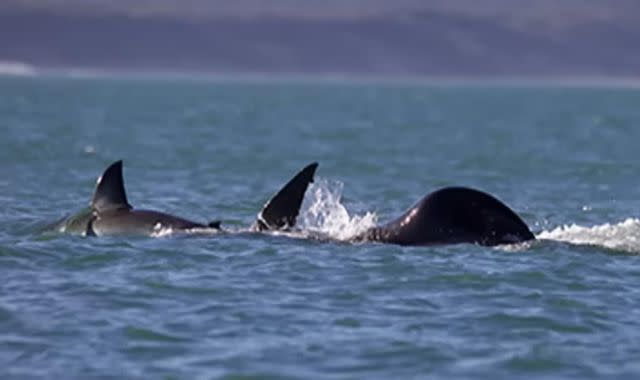Killer whale hunts down and eats great white shark in solo attack

A lone killer whale has been captured killing a great white shark in an "unprecedented" attack.
The incident took place off the coast of Mossel Bay in South Africa at around 3pm on 18 June 2023 and has now been documented in the African Journal of Marine Science.
Previous reported attacks have always involved between two and six whales, or orcas, and have taken the creatures around two hours.
But on this occasion, it took the lone orca just two minutes to kill the juvenile great white that is believed to have weighed around 100kg and measured 2.5m.
Dr Alison Towner, of Rhodes University in Grahamstown, South Africa, described the incident as "unprecedented" and "astonishing".
Writing in the journal, she describes a team being launched at around 2pm that day following sightings of two well-known orcas Starboard and Port.
Scientists have been studying and filming the pair working together to hunt great white sharks since 2022.
Read more from Sky News:
Humpback whales pictured having sex
New species of sea creature in UK waters
'Drumming' talent of 12mm noisy fish
At 3.02pm, researchers on the boat saw the great white emerge from the water - and Starboard immediately after.
They described how the whale "gripped the left pectoral fin of the shark and thrust forward with the shark several times before eventually eviscerating it".
Soon after the orca reappeared with "a bloody piece of peach-coloured liver in its mouth".
Esther Jacobs, of Keep Fin Alive, who witnessed the event from the boat, told Sky News: "I saw Starboard approaching the great white from behind and my stomach dropped.
"It was actually then devastating to see Starboard thrust forward and grab the shark in its jaws.
"I couldn't believe how quick it was. It felt like a lifetime to see what I thought was this top predator get taken out so quickly and easily."
According to the researchers, Port and Starboard appear to have often aimed for sharks' livers, which are rich in energy and nutrients.
A shark's liver takes up around a third of its body weight, according to Dr Towner, and is "packed full of nutrients and lipids".
"Because killer whales are so specialised and so efficient at what they do, they often just take a specific portion of their prey and discard the rest.
"The liver is obviously the part of the shark they are interested in."
The pair work together well, with their dorsal fins bent in opposite directions, encircling their prey so as not to get attacked themselves.
The 18 June incident not only reveals more about orcas' hunting capabilities but also suggests great whites could be at risk of being displaced from coastal sites.


